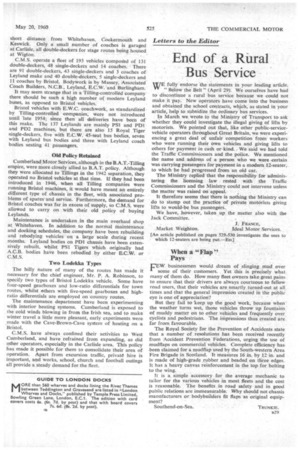Letters to the Editor
Page 63

If you've noticed an error in this article please click here to report it so we can fix it.
• End of a Rural Bus Service
WE fully endorse the statements in your leading article, " "Below the Belt" (April 29). We ourselves have had to discontinue a rural bus service because we could not make it pay. New operators have come into the business and obtained the school contracts, which, as stated in your article, help to subsidize the ordinary bus services.
In March we wrote to the Ministry of Transport to ask whether they could investigate the illegal giving of lifts by motorists. We pointed out that, like other public-servicevehicle operators throughout Great Britain, we were experiencing a great deal of unfair competition from workers who were running their own vehicles and giving lifts to others for payment in cash or-kind.. We said we had told the Traffic Commissioners and the police. We mentioned the name and address of a person who we were certain was carrying passengers for payment in a modem 12-seater, to which he had progressed from an old car.
The Ministry replied that the responsibility for administering the licensing law rested with the Traffic Commissioners and the Ministry could not intervene unless the Matter was raised on appeal.
It therefore seems that there is nothing the Ministry can do to stamp out the practice of private motorists giving lifts to would-be bus passengers.
We have, however, taken up the matter also with the Jack Committee.
J.FRANCE, Market Weighton. Ideal Motor Services.
[An article published on pages 529-530 investigates the uses to which 12-seaters are being put—En;]
When a Flap " ..Pays
rEw businessmen would dream of slinging mud over some of their customers. Yet this is precisely what many of them do. How many fleet owners take great pains to ensure that their drivers are always courteous to fellow road users, that their vehicles are smartly turned-out at all times and that the general impression created in the public eye is one of appreciation? • But they fail to keep up the good work, because when the weather turns wet, those vehicles throw up fountains of muddy matter on to other vehicles and frequently over cyclists and pedestrians. The impressions thus created are far from favourable.
The Royal Society for the Prevention of Accidents state that a number of resolutions has been received recently from Accident Prevention Federations, urging the use of mudflaps on commercial vehicles. Complete efficiency has -been claimed for a mudflap used by the South-western Area Fire Brigade in Scotland. It measures 16 in. by 12 in. and is made of high-grade rubber and beaded on three edges. It has a heavy canvas reinforcement in the top for bolting to the wing.
It is a simple accessory for the average mechanic to tailor for the various vehicles in most fleets and the cost is reasonable. The benefits in road safety and in good public relations are immeasurable. Why should not chassis manufacturers or. bodybuilders fit flaps as original equipment?
Southend-on-Sea. TRUNKIE.




















































































































